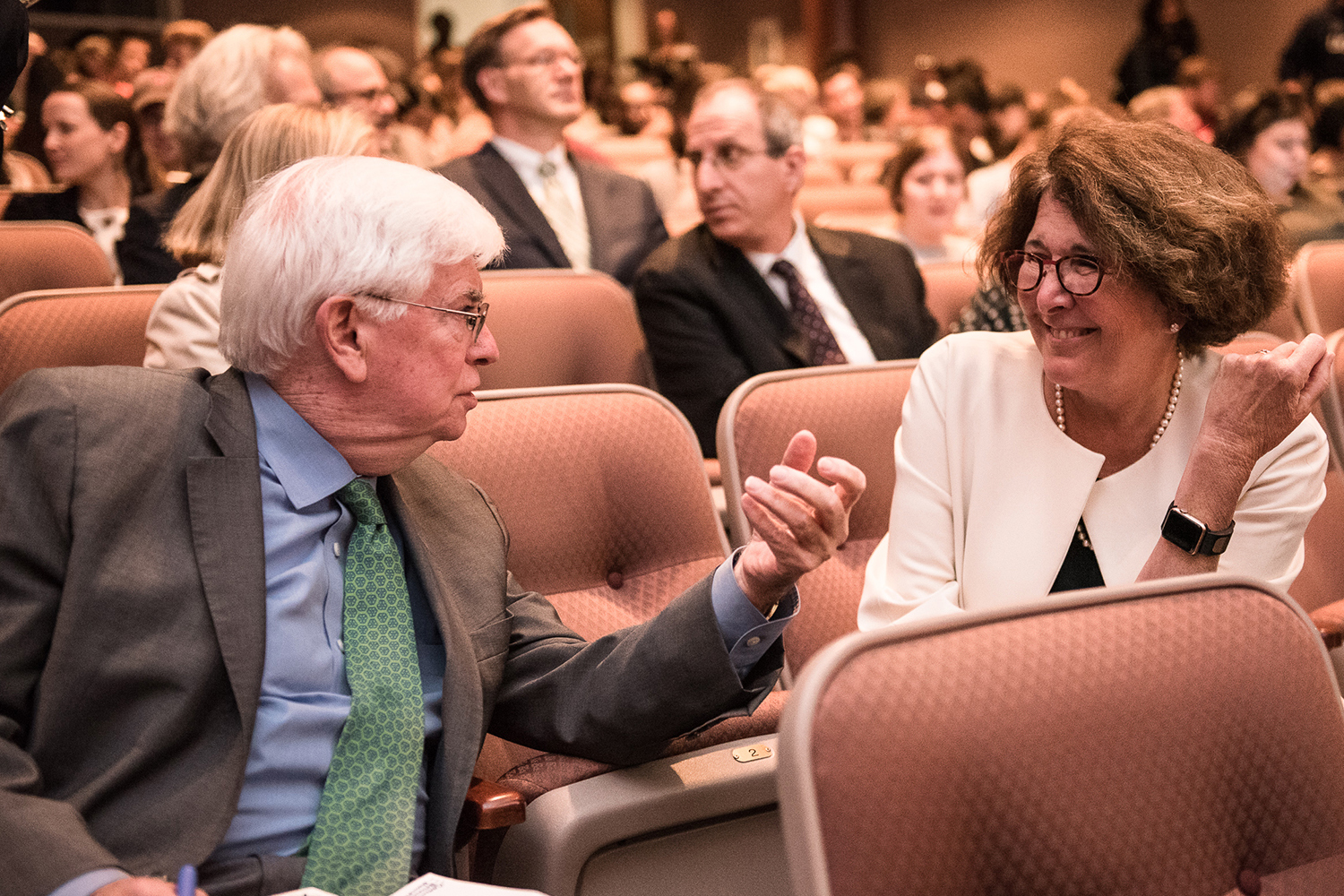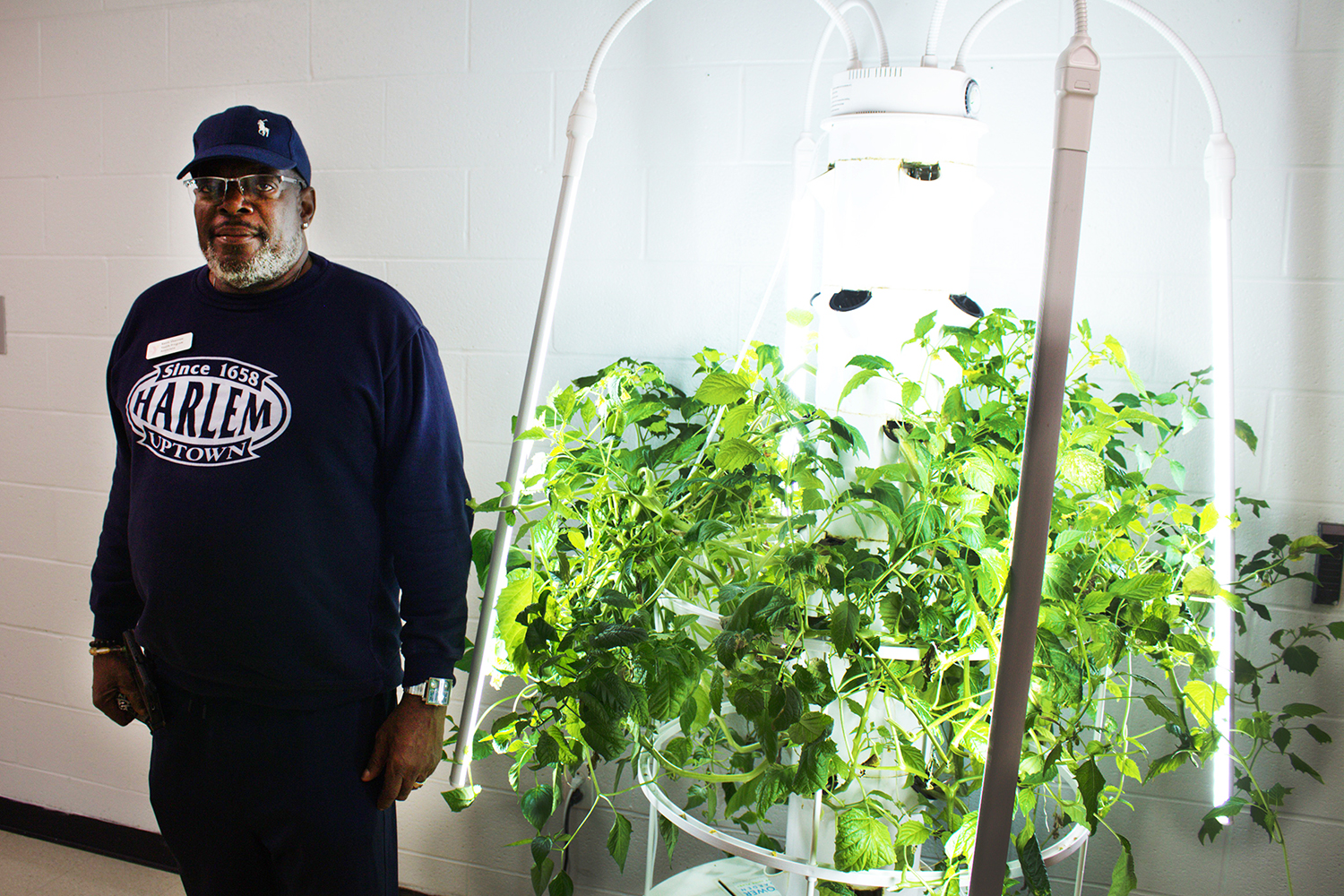Investment titan Amy Domini, widely considered a leading pioneer in socially responsible investing, came to UConn and shared what can only be described as good news.
Investor demands have radically changed the way corporations do business, and it is nearly impossible to find a major company today that isn’t re-examining or inventing policies that address human rights and environmental protection, she said.
“I don’t believe that companies have the right to make money from the destruction of our future,” she said in a keynote address titled, “How Responsible Investors Have Enabled Business to be a Solution to Human Suffering.”
Domini is the founder and chair of Domini Impact Investments, an investment company with a portfolio in excess of $2 billion, which uses social and environmental standards in making all of its investment decisions. In 2005, Time magazine named her to its list of the world’s 100 most influential people.
“From the early days, I knew this was my path,” she told students, faculty and other guests, including retired U.S. Sen. Chris Dodd, who packed Konover Auditorium at the Dodd Center.
The program was organized and hosted by the Business and Human Rights Initiative, of which the School of Business is a partner. Her keynote address kicked off a two-day symposium, which attracted leading scholars and practitioners from around the world to discuss the “human face of finance.”
“The money we spend, borrow and invest has an enormous impact on the livelihood of those we may never meet but still should care about,” said Stephen Park, professor of business law and the Satell Fellow in Corporate Social Responsibility, who serves as director of the Business and Human Rights Initiative. “The protection of human rights goes right through our pocketbooks and our investment portfolios. Ethical investors, such as Amy Domini, are at the forefront of the long battle to find the most effective means of ‘doing well by doing good.'”
Creating a ‘Social Index’ for Investing
Domini’s company was the first to create a social index for investing.
“For me, this was the light bulb moment. My goal was clear, infiltrate the belly of the beast we call Wall Street; build a presence for good from within,” she said. Her life’s work has been to calculate the true value of a corporation. She developed a matrix that examined things that others had overlooked—such as the percentage of women on a company’s board of directors, its impact on the environment and human health, and the ratio between the CEO’s salary and that of the median worker.
“Now we have well-documented insight into management and corporate culture,” she said. “We were able to change the dialogue between Wall Street and responsibility. Now companies are forced to look at things like human dignity.”
Shareholders have rights, she said, and many are eager to funnel money into less traditional investments, like minority entrepreneurship and green technology. Data equals knowledge and knowledge leads to change, Domini said.
“The lure of profits can lead to horrible behavior,” she said. “But now the tide has turned.”
And the tide has turned dramatically. Even within the last three years, the change has been phenomenal, she said. And the creation of new high-impact companies has been revolutionary, from a Japanese bank to serve female entrepreneurs, to a South African insurance company dedicated to black empowerment, to a French company that is creating medical testing that can take place in remote locations.
Even within traditional and long-established companies, CEOs are taking a stand against wrong-doing.
“To the young people here, I can’t explain the shock of having a CEO join with the under-privileged and under-served in our nation,” she said. “We have come a long way over this past century. Our definition of what business means and what the role of companies ought to be has quite literally changed the lives of millions.”
The scholars and practitioners in attendance were particularly moved by Domini’s presentation.
“She is dynamite, a true pioneer. She defined the industry,” said Motoko Aizawa, a panelist at the symposium’s workshop and formerly the managing director for the Institute for Human Rights and Business. “She’s always been my icon. I was excited to hear her speak.”
Larry Beeferman of Harvard University, who also participated in the symposium’s workshop, said he was fascinated by Domini’s explanation that she built her success on careful listening to the arguments of her opponents and that she used those conversations to gather intelligence.
“I was intrigued to hear that,” he said. “I got a feel for how she succeeded. She uses a combination of hard sell and soft sell to make her case. I think she engages people, especially with so many young people in the audience, and knows how to connect with them.”
Domini: Remember the Vulnerable
“We live in a world of tremendous contrast,” Domini said. “Some companies do tremendous damage, and some do wonderful things.”
The dangers of lead to the health of young children has been known for decades, yet there is lead in the drinking water in Flint, Mich.,; tobacco is a killer, but is still sold; asbestos has been a known to cause lung disease; and plastic junk, the size of the state of Texas, is filling our oceans, she said.
On the other hand, the CEO of Proctor and Gamble, for instance, talks about using reclaimed beach plastic, moving manufacturing closer to the consumer, and reducing water usage, she said, adding there’s a new corporate momentum underway, with more to follow.
“In my wildest dreams, I never thought I’d see this,” Domini said. Companies are standing by dreamers, rejecting racism, opposing hatred and even removing items, like guns, from store shelves if they conflict with their corporate mission.
When one student asked her how consumers can persuade companies to care more about the environment, Domini said boycotting is very effective. “Drop the plastic water bottles, and replace them with re-useable ones,” she said. “That would be a huge boycott, and a huge environmental victory.”
Domini closed her remarks with a message to all: “Thank you for your commitment and remember the vulnerable as you go about building your own lives,” she told the audience.
“She is spectacular,” said Christine Shaw ’91, J.D. ’96, MBA ’09, chief compliance officer at the Connecticut Office of the Treasurer and a panelist at the symposium’s workshop. “She defined the whole approach of impact investing. I was excited to hear the genesis of the idea and the way she built on it. I thought the presentation was a great opportunity.”
Anne M. Tucker, a law professor Georgia State University, who presented a paper at the symposium’s workshop, said she was interested in Domini’s strategies and philosophy. “One of the great things about academia is that we can pursue our own directions. But sometimes it can be very isolating,” she said. “To hear her perspective, first-hand, was a gift.”



